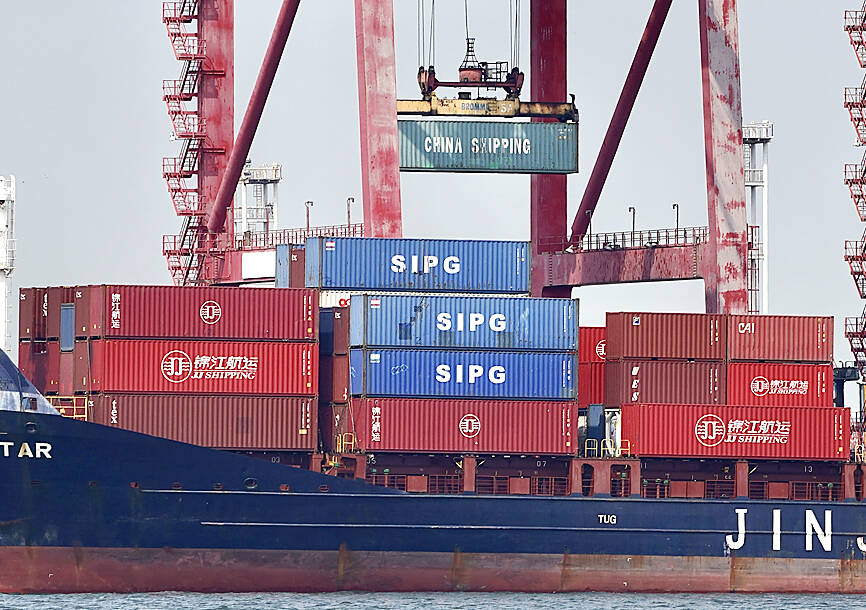Growth in export orders returned to positive territory for the first time in seven quarters last quarter, thanks to rising demand for chips used in artificial intelligence (AI) applications and high-performance computing (HPC) applications, the Ministry of Economic Affairs said yesterday.
Export orders in the April-to-June quarter expanded 6.95 percent annually from US$132.35 billion a year earlier to US$141.55 billion, after orders last month grew slower than expected at 3.1 percent year-on-year amid weak demand for notebook computers and smartphones, the ministry said.
The ministry said it had expected an annual expansion of at least 10.9 percent.

Photo: CNA
During the first half of this year, export orders rose 2.3 percent to US$274.86 billion, compared with US$268.56 billion a year ago, it said.
“The latest data re-enforced our confidence that export orders are back to a recovery mode and expected to grow steadily in the second half of the year,” Department of Statistics Director Huang Yu-ling (黃于玲) said via telephone. “Restocking demand before the shopping season also helps.”
The ministry forecast export orders this month to reach US$46.5 billion to US$48.5 billion, representing an annual decline of 2.6 percent to a growth of 1.6 percent, Huang said, attributing the slight improvement to a higher comparison base in July last year.
Orders of information and communications technology products last month increased 3.6 percent annually to US$12.74 billion, backed by robust demand for AI applications, and cloud-based devices and servers. During the first six months, orders sank 1.5 percent to US$77.49 billion.
Orders of electronic products rose 6.3 percent to US$15.54 billion last month, primarily fueled by robust demand for foundry services, AI-related applications and HPC devices, the ministry said. Orders in the first six months jumped 10.4 percent to US$96.69 billion.
Orders for optoelectronics products expanded 5.8 percent to US$1.79 billion last month, attributable to increases in demand for camera lens modules and optronic inspection tools, as the US and Europe boosted semiconductor manufacturing equipment spending. Orders jumped 11 percent to US$9.91 billion in the first half.
Orders of base metals orders rose 2.5 percent to US$2.1 billion last month, thanks to improving demand for stainless steel and copper foils, the ministry said. However, orders in the first half fell 0.3 percent to US$12.84 billion.
Orders of machinery goods climbed 3.4 percent to US$1.67 billion last month due to better demand for new manufacturing equipment, but orders in the first half dipped 3.8 percent to US$9.51 billion, the ministry said.
Orders of plastic products increased 2.7 percent to US$1.6 billion on higher average selling prices and rising inventory restocking demand. Orders expanded 1.7 percent to US$9.58 billion in the first two quarters, it said.
Lastly, orders for petrochemical products grew 9.5 percent last month to US$1.6 billion, as higher global crude oil prices helped boost product prices. Orders rose 5.6 percent to US$9.27 billion in the first half, the ministry said.

Taiwan’s rapidly aging population is fueling a sharp increase in homes occupied solely by elderly people, a trend that is reshaping the nation’s housing market and social fabric, real-estate brokers said yesterday. About 850,000 residences were occupied by elderly people in the first quarter, including 655,000 that housed only one resident, the Ministry of the Interior said. The figures have nearly doubled from a decade earlier, Great Home Realty Co (大家房屋) said, as people aged 65 and older now make up 20.8 percent of the population. “The so-called silver tsunami represents more than just a demographic shift — it could fundamentally redefine the

The US government on Wednesday sanctioned more than two dozen companies in China, Turkey and the United Arab Emirates, including offshoots of a US chip firm, accusing the businesses of providing illicit support to Iran’s military or proxies. The US Department of Commerce included two subsidiaries of US-based chip distributor Arrow Electronics Inc (艾睿電子) on its so-called entity list published on the federal register for facilitating purchases by Iran’s proxies of US tech. Arrow spokesman John Hourigan said that the subsidiaries have been operating in full compliance with US export control regulations and his company is discussing with the US Bureau of

Businesses across the global semiconductor supply chain are bracing themselves for disruptions from an escalating trade war, after China imposed curbs on rare earth mineral exports and the US responded with additional tariffs and restrictions on software sales to the Asian nation. China’s restrictions, the most targeted move yet to limit supplies of rare earth materials, represent the first major attempt by Beijing to exercise long-arm jurisdiction over foreign companies to target the semiconductor industry, threatening to stall the chips powering the artificial intelligence (AI) boom. They prompted US President Donald Trump on Friday to announce that he would impose an additional

Pegatron Corp (和碩), a key assembler of Apple Inc’s iPhones, on Thursday reported a 12.3 percent year-on-year decline in revenue for last quarter to NT$257.86 billion (US$8.44 billion), but it expects revenue to improve in the second half on traditional holiday demand. The fourth quarter is usually the peak season for its communications products, a company official said on condition of anonymity. As Apple released its new iPhone 17 series early last month, sales in the communications segment rose sequentially last month, the official said. Shipments to Apple have been stable and in line with earlier expectations, they said. Pegatron shipped 2.4 million notebook